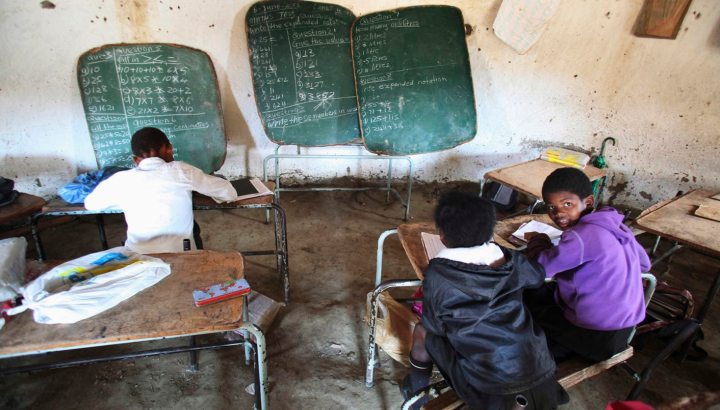South Africa
GroundUp: Schools suffer while Eastern Cape fails to spend education budget

Dalagubha Junior Secondary School near Libode has no piped water and the ceilings are broken. The high school nearby has broken windows, no ceilings in classrooms, and for part of the year classes are held under trees. So why is the Eastern Cape Department of Education not spending its infrastructure budget? By NOMBULELO DAMBA-HENDRIK for GROUNDUP.
According to a statement by Equal Education, Finance Minister Pravin Gordhan has cut the Eastern Cape Education Infrastructure Grant (EIG) by 12%, from about R1.7-billion in the 2015/16 year to R1.5-billion in 2016/17. This is because the grant was underspent.
Andile Cele of Equal Education explains that for the year ending March 2015, the grant was underspent by R211-million. Then in the current financial year the Eastern Cape government did not get its fourth quarter EIG transfer because of underspending. “There aren’t actual spending figures for 2015/16 as the financial year only ends in March. But we can deduce that of the R1.7-billion EIG allocation, a quarter was not transferred,” Cele told GroundUp.
This underspending is something Madakhile Luswazi cannot understand. Luswazi was involved when Dalagubha Junior Secondary School in Dalagubha location was started in 1971. The school is in Libode in the Eastern Cape, between Mthatha and Port St Johns.
The school was started by parents. First the parents used a small church, then five years later, by 1976, they decided to build their own school, little by little. Luswazi, a former member of the school governing body, said each house had paid R100.
“I still remember that day. We built one classroom, then we told the teachers to bring the kids. We thought one classroom was going to be enough, but teachers told us they had children up to Standard 5. We then collected more money. Each house added R50. We managed to build eight classrooms from our pockets,” she said.
Each year parents pay to fix the ceilings, windows and cracks in the walls. This school has no access to piped water. Students have to fetch water from the river and keep it in buckets, and this has to last for a few days. The area has taps but most have no water. Many of the children walk 7kmor more to school every day.
“It pains me to hear there’s money the Department of Education failed to use while they should have built us a new school,” said Luswazi.
When GroundUp visited the school this week, the ceilings in all the classrooms were damaged. In two of the classrooms the sky was visible through the roof.
Grade 7 pupil Ezile Malangeni said when it rained the water came into the classroom and when it was windy she was afraid the roof might blow away. “If there was another school in the area, I would change to it, but this is the only [nearby] school,” she said. Dalagubha takes students from Grade R to Grade 9.
Teachers said the only thing the Department of Education provided was furniture.
In 1997 parents opened a high school too for the children of Libode, Xhentse Senior Secondary School. Again they used a lot of their own money. The school has 297 students and caters for Grades 10 to 12. All the classrooms are overcrowded, there are no ceilings and students complain about the heat, the water that comes in when it rains, and the broken windows.
One of the teachers said that each year the department promises to build a school but the promises turn out to be empty.
“Instead of building us a school they built us six toilets for the whole school,” he said.
Since 2011 the school had managed a matric pass rate of more than 80%, but last year the rate dropped to 57%. The teacher said that during exams, Grade 12 students occupied all three classrooms, leaving the two other grades studying under trees.
Equal Education has called on the National Treasury to hold the Eastern Cape Education Department accountable for underspending.
“Treasury cannot simply accept low spending — ultimately returned funds — from provinces. There need to be penalties for this and a mechanism put in place to ensure that implementation plans are met. It is not enough to withhold funds, as this perpetuates the lack of delivery, and our children suffer the consequences. This is unacceptable,” the statement said.
GroundUp sent detailed questions to the Eastern Cape Department of Education a week ago. We have followed up with further questions and requests for comment. No substantive response has yet been received. DM
Originally published on GroundUp
Photo: Children write notes from a makeshift black board at a school in Mwezeni village in South Africa’s Eastern Cape Province in this picture taken June 5, 2012. REUTERS/Ryan Gray.
















 Become an Insider
Become an Insider